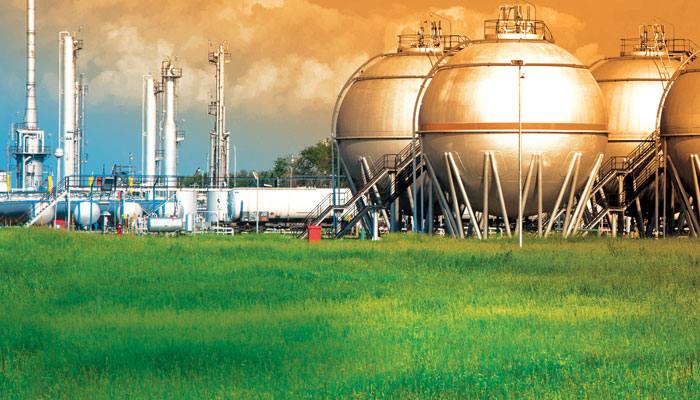Natural gas has been touted as a “bridge fuel” that can provide energy while our nation transitions to cleaner energy and renewables, because natural gas is less carbon intensive, and there’s ample domestic supply.
But a new study released in February concludes that switching over fleets of trucks and buses to natural gas could actually increase greenhouse gases. Natural gas may provide some environmental benefits over petroleum, but too much is lost to the atmosphere, according to the study. “Switching from diesel to natural gas, that’s not a good policy from a climate perspective,” said Adam R. Brandt, the study’s lead author.
The key component of natural gas is methane, a greenhouse gas that is 30 times more potent than carbon dioxide, and much more effective at trapping heat in the atmosphere. As natural gas is extracted, processed, and transported through pipelines to their consumers, about 1.5 percent of it “leaks” or escapes.
A little alarming: The study also determined that there is already about 50 percent more methane in the atmosphere than previously estimated by EPA. Scientists and researchers from Stanford, MIT and the National Renewable Energy Laboratory conducted the study and published the results in the journal Science. The study is considered the first comprehensive look at North American methane emissions.
Key Findings
In general, the study suggests a poor understanding of excess methane sources and points to areas where improved science is needed. The study finds that hydraulic fracturing, the controversial extraction technology also known as “fracking,” is “unlikely to be a dominant contributor” to total methane emissions.
The study determined that diesel-powered engines in trucks and buses emit less harmful emissions than the same vehicle running on natural gas. Burning natural gas typically produces about 30 percent less carbon dioxide emissions than diesel fuel, but methane leaks cancel out any greenhouse gas benefits gained by using natural gas as a transportation fuel, according to the study. “Even running passenger cars on natural gas instead of gasoline is probably on the borderline in terms of climate,” the lead author noted.
The study did not discuss Bioheat® heating oil and the use of ultra-low sulfur heating oil, but you can correlate similarities with diesel, and conclude that the environmental benefits of heating your home with natural gas have also diminished.
Fortunately, the study suggests that the bulk of emissions are coming from a small fraction of “super-emitter” sources at well sites, processing plants, liquid storage tanks, transmission compressor stations and distribution systems.
Leaks Are Easy to Fix
Independent experiments suggest that a small number of super-emitters could be responsible for a large percentage of leaks. They also noted that many of the fixes necessary are economically profitable at moderate natural gas prices. The study suggests that most of the methane leaks could be fixed with existing technology and the repairs wouldn’t be expensive, since they would reduce the amount of lost product.
Methane leak detection systems are improving to be much more sensitive than older systems, meaning small leaks can be found and repaired early with regular inspections. Facility studies using existing technology have found leakage detection and repair programs to be profitable.
Need for Regulations
Environmental groups say we need comprehensive EPA regulations to compel oil and gas companies to invest in technology to prevent methane leaks. They added that by moving the industry in the right direction, it would actually help the industry become more productive and profitable.
Natural gas folks say that since producers are voluntarily reducing methane emissions, additional regulations are not necessary. They argue that it is in their own interest to fix the leaks and capture escaping methane. Methane is natural gas, so capturing more of it helps companies deliver more energy to consumers.
In February, Colorado became the first state in the nation with strict limits on methane emissions from the state’s oil and gas industry, requiring various anti-leak technologies with regular leak inspections on tanks, pipelines and other equipment.
New York and the Northeastern states have been pushing for the EPA to create similar federal regulations that would require companies to install equipment at wellheads to prevent leaks; use valves that don’t allow methane to escape; and submit to regular inspections.
The study concluded that if natural gas is to be a “bridge” to a more sustainable energy future, it is a bridge that must be traversed carefully: Diligence is required to ensure that leakage rates are low enough to achieve sustainability goals.


